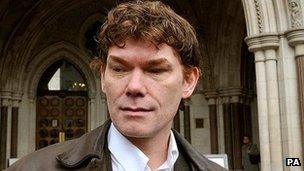Gary McKinnon's extradition case adjourned for medical report
- Published

Gary McKinnon is accused of hacking into US military computer systems
Computer hacker Gary McKinnon has been given two weeks by the High Court to decide if he will take a medical test to see if he is fit to be extradited.
Experts say there is a high risk Mr McKinnon, who has Asperger's syndrome, could kill himself if extradited, but ministers want a new report.
Home Secretary Theresa May is said to be "very near" a decision.
Mr McKinnon, from north London, admits hacking US military computers but says he was looking for evidence of UFOs.
If he is convicted in the US, he could face up to 60 years in jail.
'Highly detrimental'
Lawyers for the home secretary said she was "extremely concerned" by the conclusion from one medical report that said Mr McKinnon was unfit to plead.
The High Court has to decide how much time should be given before Mrs May announces whether or not Mr McKinnon, 46, should be extradited, the BBC's Ben Geoghegan says.
If the home secretary decided he can be extradited, Mr McKinnon's legal team would be likely to challenge the decision by asking for a judicial review, our correspondent says.
On Thursday, Mr McKinnon's lawyer, Ben Cooper said his client would not wish to undergo another medical test. He said it would be "highly detrimental to [Mr McKinnon's] fragile mental state".
Mr McKinnon now has until 19 July to make a final decision and there will be a further hearing at the High Court on either 23 or 24 July.
Mr McKinnon, who hacked into the US computers in 2002, has been fighting extradition since 2006.
The High Court expressed concern over how long Mr McKinnon's case was taking to return to court earlier this year.